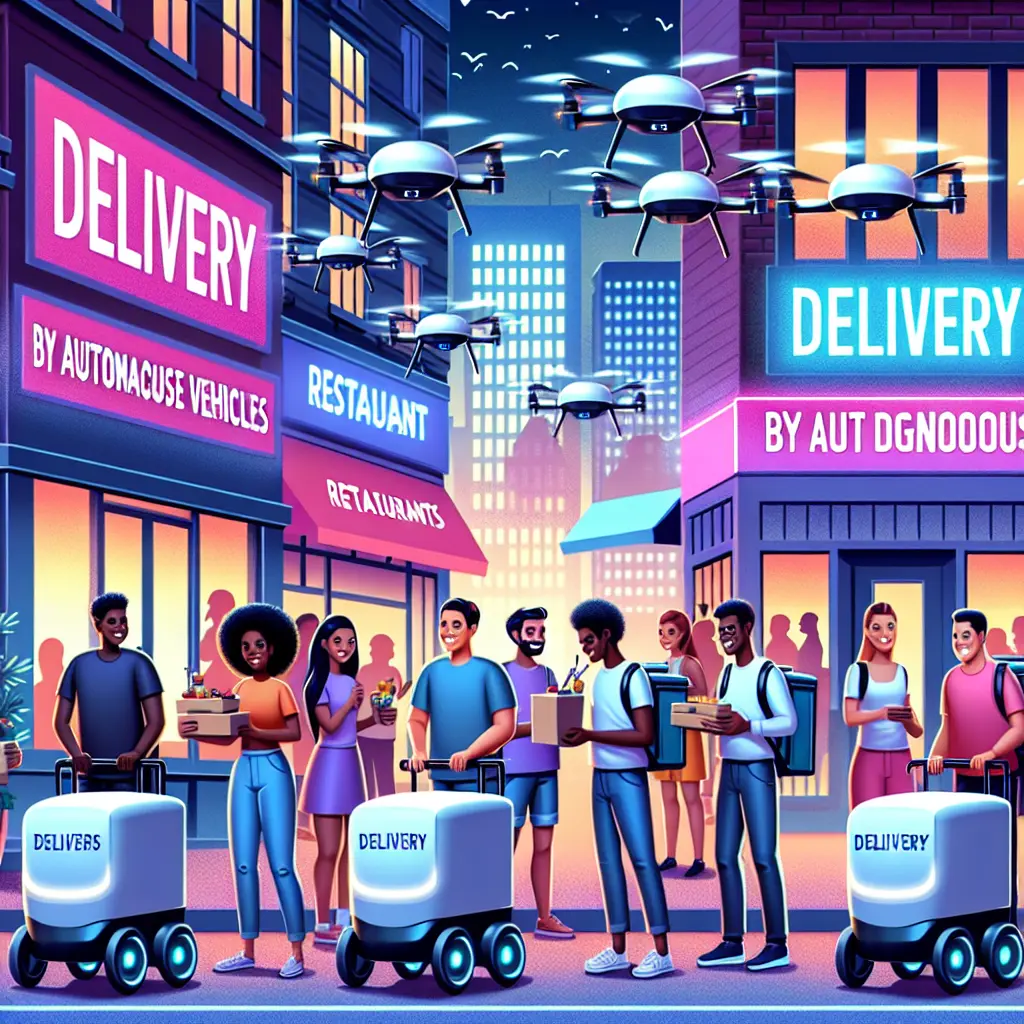
Revolutionizing Food Delivery with Autonomous Vehicles
In today's rapidly advancing world of food tech innovation, autonomous vehicles are at the forefront, transforming how we think about food delivery. These self-driving cars and delivery robots are not only reshaping last-mile delivery but are also setting new benchmarks in urban mobility. As they revolutionize the food delivery landscape, they offer unprecedented convenience and reliability, making driverless delivery a cornerstone of modern logistics.
The Current State of Autonomous Food Delivery
The integration of AI in food delivery systems is enhancing delivery efficiency and paving the way for smart logistics solutions. These solutions are not only sustainable but also contactless, meeting the growing demand for eco-friendly practices in a world increasingly conscious of its carbon footprint. For example, in San Francisco, self-driving taxis have become a reality, showcasing the tangible impact of these technologies on urban mobility (source).
Case Studies: Success Stories in Autonomous Delivery
One notable example is the testing of robot servers by restaurants, which effectively blend robotics in delivery applications with traditional dining experiences. This innovative approach aligns with sustainable delivery solutions and appeals to tech-driven food services aiming for higher efficiency and lower environmental impact (source).
In South Korea, there is a surge in technology-driven urban mobility solutions. Their unique approach to blending tradition with cutting-edge technology resonates well with the transformation autonomous delivery vehicles are bringing to logistics in the food industry (source).
Challenges and Opportunities in the Autonomous Revolution
Despite these advancements, the journey is not without challenges. The worsening climate crisis adds pressure on industries to adapt quickly. For instance, as people consider attending events like Burning Man in extreme climates, the shift towards sustainable practices becomes more urgent (source). Autonomous vehicles provide a solution by offering efficient, low-emission alternatives to traditional delivery methods.
Similarly, the resilience demonstrated by Marshall Fire victims in Colorado highlights how technology, like driverless delivery systems, can bring about systemic improvements in both logistics and community resilience (source).
The Role of AI and Smart Logistics
AI plays a crucial role in this transformation by optimizing routes for self-driving cars and delivery robots, ensuring faster and more reliable service. This technology also aids in developing automated delivery systems that learn and adapt to changing urban landscapes, further enhancing delivery efficiency (source).
Looking Ahead: The Future of Food Delivery
As we look toward the future of food delivery, it's clear that autonomous vehicles will play an integral role. Recent technology developments highlight a growing comfort with automated interactions while emphasizing the need for maintaining human connection amidst technological advances (source).
Current market dynamics, such as declining Starbucks visits due to pricing issues (source), suggest that autonomous delivery offers a cost-effective alternative that could revitalize consumer interest through reduced operational costs and enhanced service offerings.
Finally, as autonomous vehicles continue to revolutionize food delivery, they offer a glimpse into a future where technology seamlessly meets everyday needs. With smart logistics and AI in food delivery leading the charge, the food industry is poised for a transformation that promises not only efficiency but also sustainability and enhanced consumer experiences.
Embracing the Future of Food Delivery
As we stand on the brink of a transformative era in food delivery, the integration of autonomous vehicles and AI emerges as a game-changer. These technologies are not merely enhancing efficiency but are also redefining the logistics landscape with sustainable, contactless solutions. The successful implementation of driverless cars and delivery robots in places like San Francisco and South Korea underscores their potential to revolutionize urban mobility and reshape our daily interactions with food services.
Despite challenges posed by climate change and the need for sustainable practices, autonomous delivery systems offer a promising path forward. They provide a low-emission alternative that aligns with global eco-friendly goals while optimizing delivery processes through AI-enhanced route planning. These advancements promise faster, more reliable services and contribute to community resilience by enabling systemic improvements in logistics.
As we look ahead, the future of food delivery is intertwined with the ongoing evolution of smart logistics and technology-driven services. Autonomous vehicles hold the key to revitalizing consumer interest by offering cost-effective and enhanced service offerings. However, amidst these technological strides, maintaining human connection remains crucial.
I invite you to reflect on how these innovations might impact your life or business and to share your insights or experiences with autonomous food delivery. What opportunities or challenges do you foresee in this rapidly advancing field?
Let's continue this conversation as we explore the possibilities and embrace the exciting journey into a future where technology seamlessly meets everyday needs.
Author: Amelia Lawson
For further exploration of this topic and to stay updated on industry developments, visit reputable sources such as Forbes for expert insights.